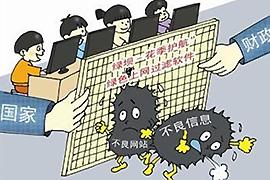Q&A: China’s Green Dam web filter
A look at the Chinese internet filter that has stirred controversy.

It is also supposed to filter written content, with options to block a range of categories of websites including one entitled “illegal activities”.
The software is reportedly already in use in Chinese internet cafes and since the start of 2009 has been installed in computers sold under a government programme that subsidises rural sales.
Why has it been delayed?
 |
| China had ordered Green Dam shipped with every computer sold after July 1 |
The order that all computers must be shipped with the software has caused outcry from, among others, Chinese internet users, free speech groups and international trade watchdogs.
Probably the most significant factor though was the simple impracticality for Chinese and international computer manufacturers to comply with the order in time for the July 1 deadline.
Nonetheless the delay is an embarrassing climb-down for the Chinese government, which does not like to be seen backtracking on its orders.
No reason was given for the decision.
The government’s reversal, with no new deadline set, will be seen as a major loss of face and almost certainly there will be repercussions behind the scenes for the officials responsible.
Why has Green Dam proved controversial?
 |
| Garfield: Considered indecent by the Green Dam image filter [GALLO/GETTY] |
Criticism of Green Dam has soared in the weeks since the July 1 deadline first came to light – in part over fears that it will be used to extend censorship and also because of concerns over the features and limitations of the software itself.
Independent groups testing the software have said it is unstable and has a range of technical problems, including large holes in its scanning software that easily allow sexually explicit images to be shown while other innocent images are blocked as “indecent”.
One test of the image scanning software, for example, blocked access to an image of the cartoon cat Garfield, apparently interpreting his orange fur as naked human flesh.
Another test blocked access to images of flesh-coloured cooked pork.
Others have said the software could easily be exploited by hackers seeking access to users’ personal data, or by security services looking to snoop on suspected dissidents.
One feature of Green Dam allows the software to take regular snapshots of a user’s screen and stores them – ostensibly so parents can monitor their children’s online activity.
But it could also potentially provide security officials with a monitor of computer use by a suspected dissident, or be a gift to fraudsters hunting online bank details and private information.
What other controls does the government have on web use?
 |
| The bugs are labelled “bad internet” and “harmful information” |
According to internet and media monitoring groups such as Reporters Without Borders, China has one of the tightest systems of online regulation in the world.
China’s police are believed to have a dedicated force of thousands of officers to monitor and block suspected online dissent or other activities deemed “undesirable”.
There are also strict regulations on service providers and internet cafes to keep records of users’ online activities and the sites they have visited.
Access to social networking sites such as Facebook, Myspace, Twitter and YouTube is regularly blocked or disrupted at politically sensitive times, such as the recent anniversary of the 1989 Tiananmen Square crackdown.
Are the web controls effective?
The number of Chinese internet users has soared in recent years and shows no signs of slowing.
Last year China overtook the US as the world’s largest online population with some 298 million regular users – up 41.9 per cent on the previous year.
A study also found that almost half of China’s student population use their mobile phones to access the internet for news, email and to blog – this even before China introduces high-speed 3G mobile services.
Moreover, China’s overall internet penetration is still relatively low at just over 22 per cent, leaving plenty of room for further rapid expansion.
That of course means the amount of communication to be monitored has grown exponentially, and is likely to continue to do so.
At the same time the government has to balance concerns over online dissent and political mobilisation with moves to encourage the growth of the internet as a commercial and educational tool.
The more “web-savvy” Chinese there are, the more creative users become in dodging online regulations and breaking through the so-called Great Firewall of China.